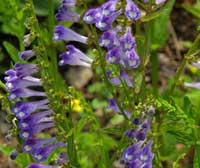New research on the anti-cancer properties of the Chinese medicine herb Ban Zhi Lian emerges from laboratories and university research facilities. Acupuncturists have used this herb for generations as an anti-toxin herb and now modern research confirms its clinical efficacy. An aqueous extract of the herb Ban Zhi Lian (Scutellaria barbata) was found to have “anti-proliferative gene expression responses in human breast and prostate cancer cells” by researchers at the University of California at Berkeley, Department of Molecular and Cell Biology.1 Researchers at the Medical School of Xi’an Jiaotong University, Department of Oncology concluded that Ban Zhi Lian “has antitumor activity and seems to be safe and effective for the use of anti-tumor therapy.”2 Other research finds that Ban Zhi Lian “exhibited potential anticancer activity… through induction of apoptosis.”3
This is a small sampling of the research into the anti-cancer properties of this herb. Clinically, Ban Zhi Lian is often combined with another herb, Bai Hua She She Cao, in the treatment of lung and gastrointestinal cancers. Often, acupuncturists administer the herbs as a supplement to conventional chemotherapy. Although the term acupuncturist is used in the USA, practitioners are often trained in both Chinese herbal medicine and acupuncture as part of the acupuncture education program of training. In many states such as California and Massachusetts, herbal training towards a minimum of a master's degree in Chinese medicine and continuing education CEUs are required to obtain and maintain an acupuncture license.
Acupuncturists are best known for treating the side effects of cancer such as pain or the side effects of chemotherapy such as hair loss, nausea, stress, exhaustion and insomnia. In states such as California, it is forbidden for acupuncturists to mention any Chinese medicine ‘cure’ for cancer. Ban Zhi Lian has never been purported to be a cure but it is a helpful tool in the fight against cancer. Its antineoplastic (anti-cancer cell) properties help fight tumor growth.

References:
1
Cancer Biol Ther. 2010 Aug;10(4):397-405. Epub 2010 Aug 20. BZL101, a phytochemical extract from the Scutellaria barbata plant, disrupts proliferation of human breast and prostate cancer cells through distinct mechanisms dependent on the cancer cell phenotype. Marconett CN, Morgenstern TJ, San Roman AK, Sundar SN, Singhal AK, Firestone GL. Source: Department of Molecular and Cell Biology, University of California at Berkeley, USA.
2
Molecules 2011, 16(6), 4389-4400; doi:10.3390/molecules16064389. In Vitro and In Vivo Antitumor Activity of Scutellaria barbate Extract on Murine Liver Cancer. Zhi-Jun Dai, Jie Gao, Zong-Fang Li, Zong-Zheng Ji, Hua-Feng Kang, Hai-Tao Guan, Yan Diao, Bao-Feng Wang and Xi-Jing Wang. Department of Oncology, the Second Affiliated Hospital, Medical School of Xi’an Jiaotong University, Xi’an 710004, China. Department of General Surgery, the Second Affiliated Hospital, Medical School of Xi’an Jiaotong University, Xi’an 710004, China.
3
African Journal of Pharmacy and Pharmacology Vol. 5(8), pp. 1046-1053, August 2011. Purified alkaloid extract of Scutellaria barbata inhibits proliferation of hepatoma HepG-2 cells by inducing apoptosis and cell cycle arrest at G2/M phase. Tie-shan Wang, Li-jing Chen, Zhao-yu Wang, Sheng-tan Zhang and Jing-ming Lin.

